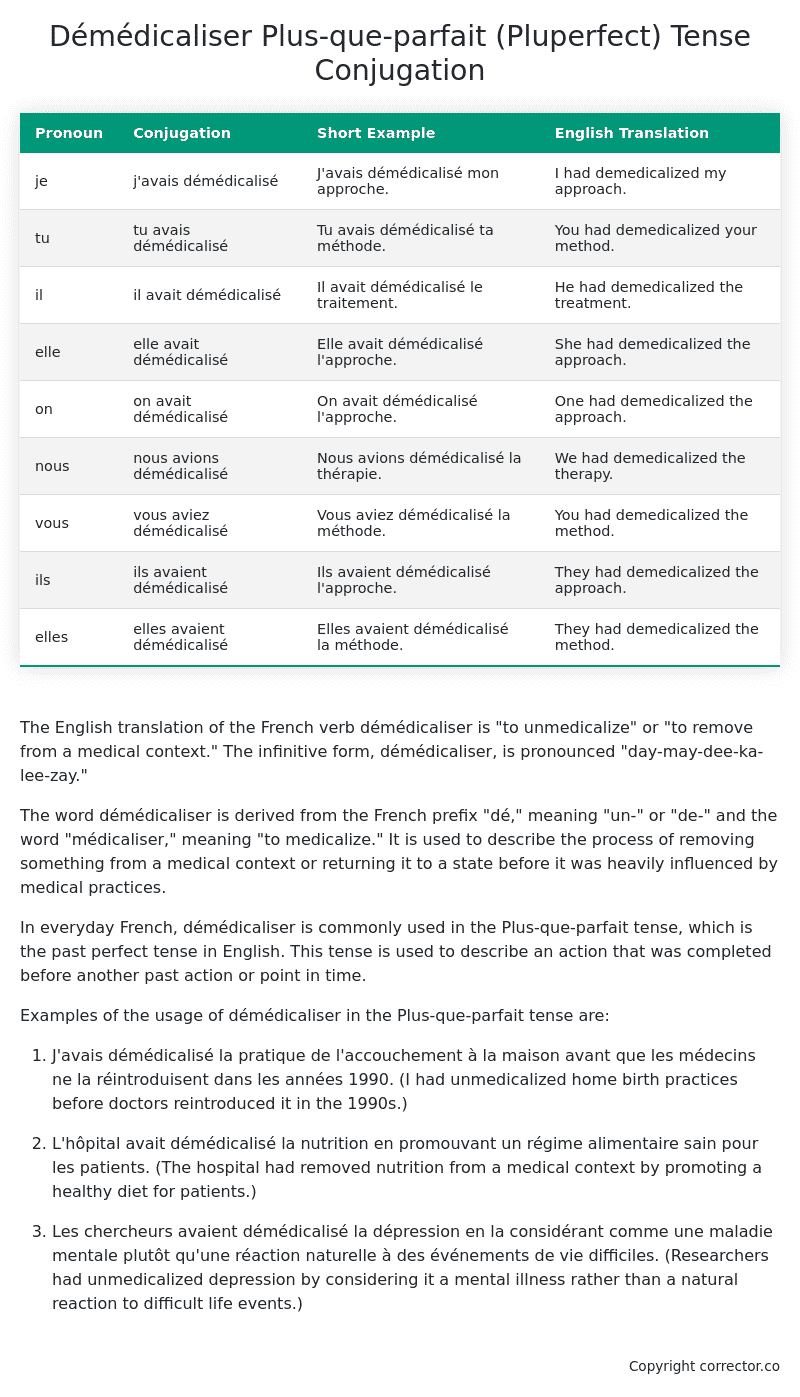Plus-que-parfait (Pluperfect) Tense Conjugation of the French Verb démédicaliser
Introduction to the verb démédicaliser
The English translation of the French verb démédicaliser is “to unmedicalize” or “to remove from a medical context.” The infinitive form, démédicaliser, is pronounced “day-may-dee-ka-lee-zay.”
The word démédicaliser is derived from the French prefix “dé,” meaning “un-” or “de-” and the word “médicaliser,” meaning “to medicalize.” It is used to describe the process of removing something from a medical context or returning it to a state before it was heavily influenced by medical practices.
In everyday French, démédicaliser is commonly used in the Plus-que-parfait tense, which is the past perfect tense in English. This tense is used to describe an action that was completed before another past action or point in time.
Examples of the usage of démédicaliser in the Plus-que-parfait tense are:
-
J’avais démédicalisé la pratique de l’accouchement à la maison avant que les médecins ne la réintroduisent dans les années 1990. (I had unmedicalized home birth practices before doctors reintroduced it in the 1990s.)
-
L’hôpital avait démédicalisé la nutrition en promouvant un régime alimentaire sain pour les patients. (The hospital had removed nutrition from a medical context by promoting a healthy diet for patients.)
-
Les chercheurs avaient démédicalisé la dépression en la considérant comme une maladie mentale plutôt qu’une réaction naturelle à des événements de vie difficiles. (Researchers had unmedicalized depression by considering it a mental illness rather than a natural reaction to difficult life events.)
Table of the Plus-que-parfait (Pluperfect) Tense Conjugation of démédicaliser
| Pronoun | Conjugation | Short Example | English Translation |
|---|---|---|---|
| je | j’avais démédicalisé | J’avais démédicalisé mon approche. | I had demedicalized my approach. |
| tu | tu avais démédicalisé | Tu avais démédicalisé ta méthode. | You had demedicalized your method. |
| il | il avait démédicalisé | Il avait démédicalisé le traitement. | He had demedicalized the treatment. |
| elle | elle avait démédicalisé | Elle avait démédicalisé l’approche. | She had demedicalized the approach. |
| on | on avait démédicalisé | On avait démédicalisé l’approche. | One had demedicalized the approach. |
| nous | nous avions démédicalisé | Nous avions démédicalisé la thérapie. | We had demedicalized the therapy. |
| vous | vous aviez démédicalisé | Vous aviez démédicalisé la méthode. | You had demedicalized the method. |
| ils | ils avaient démédicalisé | Ils avaient démédicalisé l’approche. | They had demedicalized the approach. |
| elles | elles avaient démédicalisé | Elles avaient démédicalisé la méthode. | They had demedicalized the method. |
Other Conjugations for Démédicaliser.
Le Present (Present Tense) Conjugation of the French Verb démédicaliser
Imparfait (Imperfect) Tense Conjugation of the French Verb démédicaliser
Passé Simple (Simple Past) Tense Conjugation of the French Verb démédicaliser
Passé Composé (Present Perfect) Tense Conjugation of the French Verb démédicaliser
Futur Simple (Simple Future) Tense Conjugation of the French Verb démédicaliser
Futur Proche (Near Future) Tense Conjugation of the French Verb démédicaliser
Plus-que-parfait (Pluperfect) Tense Conjugation of the French Verb démédicaliser (this article)
Passé Antérieur (Past Anterior) Tense Conjugation of the French Verb démédicaliser
Futur Antérieur (Future Anterior) Tense Conjugation of the French Verb démédicaliser
Subjonctif Présent (Subjunctive Present) Tense Conjugation of the French Verb démédicaliser
Subjonctif Passé (Subjunctive Past) Tense Conjugation of the French Verb démédicaliser
Subjonctif Imparfait (Subjunctive Imperfect) Tense Conjugation of the French Verb démédicaliser
Conditionnel Présent (Conditional Present) Tense Conjugation of the French Verb démédicaliser
Conditionnel Passé (Conditional Past) Tense Conjugation of the French Verb démédicaliser
L’impératif Présent (Imperative Present) Tense Conjugation of the French Verb démédicaliser
L’infinitif Présent (Infinitive Present) Tense Conjugation of the French Verb démédicaliser
Struggling with French verbs or the language in general? Why not use our free French Grammar Checker – no registration required!
Get a FREE Download Study Sheet of this Conjugation 🔥
Simply right click the image below, click “save image” and get your free reference for the démédicaliser Plus-que-parfait tense conjugation!

Démédicaliser – About the French Plus-que-parfait (Pluperfect) Tense
Tense Formation
Common everyday usage patterns
Sequencing of past events
Background information
Hypothetical or reported speech
Interactions with other tenses
Summary
I hope you enjoyed this article on the verb démédicaliser. Still in a learning mood? Check out another TOTALLY random French verb conjugation!


